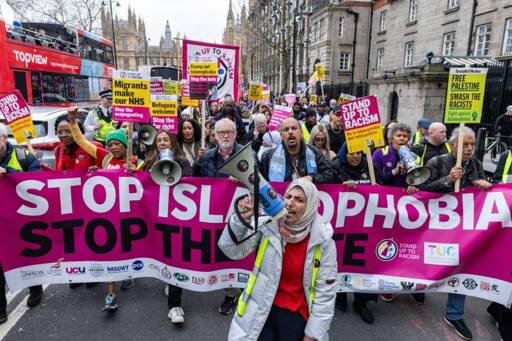There is no more honest way to describe the world we live in than this: Islamophobia has become the new global currency of power. It is traded in the speeches of politicians, exchanged in the deals of diplomats, printed in the pages of media, and laundered through the language of security and counterterrorism. It buys impunity for genocide, secures legitimacy for authoritarian leaders, and bankrolls new markets of surveillance and control. The Gaza genocide has torn away whatever illusions were left: the blood of Muslims is not just cheap; it is expendable capital in the economy of global powers.
The Gaza genocide is not an isolated catastrophe; it is the center of a global pattern. From the internment of Uyghur Muslims in Xinjiang’s camps to the expulsion of the Rohingya from Myanmar, from the headscarves torn off French Muslim girls in the name of secularism to the US “Muslim ban” dressed in the language of national security, the same logic is at work. Islamophobia is the shared language of power between democracies and dictatorships, between so-called secular republics and openly ethno-nationalist states. It allows brutality to pass as order, apartheid to pass as security, and genocide to pass as policy.
Nowhere is this more visible outside Palestine than in India, where 200 million Muslims are being pushed to the edge of extermination by the RSS-BJP regime. Under Narendra Modi, Islamophobia has been weaponised not as fringe hate but as state ideology. Laws like the Citizenship Amendment Act and the proposed National Register of Citizens have created a framework where Muslims can be rendered stateless in their own homeland. Pogroms in Delhi, lynchings over beef, bulldozers demolishing Muslim homes, and open calls for genocide from Hindutva leaders are not accidents but steps in a carefully scripted project. This project is nourished by propaganda techniques borrowed directly from Zionism: Palestinians are framed as “terrorists” the way Indian Muslims are framed as “jihadis” or “Bangladeshi infiltrators”; Gaza’s resistance is criminalised the same way Indian Muslims’ protests are portrayed as sedition. Both Zionism and Hindutva work by criminalising Muslim existence itself — and both find eager allies in Western capitals that profit from these performances of “civilisational defence.”



This hypothesis of Columbus trying to finance a crusade is heavily contested, to put it mildly.
I think it is trying to frame conflicts as part of a struggle between entities you see in the modern world. Pre-nation-state Europe was waaaayyyyy more divided than united. The entire east vs. West or even Muslim vs. Christianity narrative is accurate in modern times, but pre Napoleon it falls flat.
France had historically seen the ottomans as a preferable partner to England, religion be damned. When the ottomans conquered the Balkans, many Christians even fought on their side. The Austrian slur for Hungarians, Krüzitürken - cross bearing Turks -, reflects that.
Even the now infamous Reconquista wasnt as much of a fight between Islam and Christianity, as it was a power struggle between rulers that sometimes used Religion as a back drop. But alliances and marriages between these ruling families also crossed sectarian borders. The reframing of the Reconquista is a narrative used by Nationalists and not an accurate description of the history of the nebulous West.
Far too many people think that the political reality of the last 200 years extends back 2000